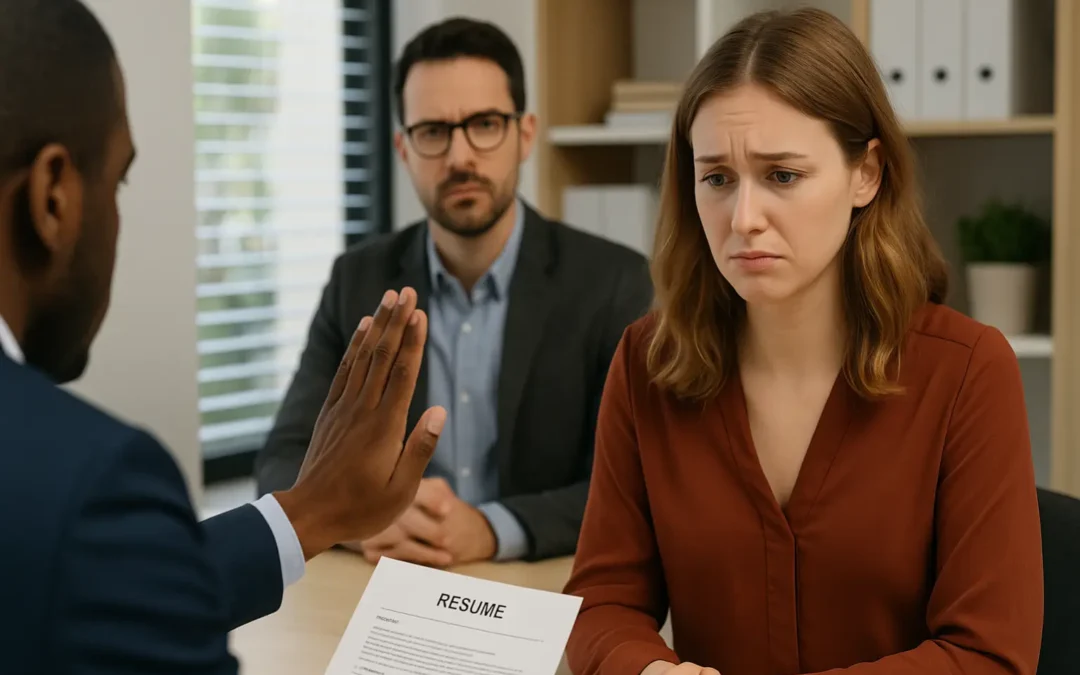
by Michael Glasser | Sep 6, 2025 | Criminal Defense Law
A Criminal Conviction Is More Than Jail Time
When people think of criminal penalties, they usually focus on the obvious: jail, probation, or fines. But the reality is that a criminal record can follow you for years—or even a lifetime—after your case is closed.
At The Law Office of Michael Glasser, P.A., we understand that protecting your future is just as important as defending your present. That’s why we fight to keep your record clean whenever possible.
What Is a Criminal Record?
A criminal record is a formal record maintained by law enforcement and the courts. It contains information about your arrests, charges, and convictions. Even if charges were dropped or dismissed, the arrest may still appear on background checks unless sealed or expunged.
In Florida, your criminal record is accessible to:
-
Employers
-
Landlords
-
Licensing boards
-
Schools
-
Government agencies
Employment Challenges
Most employers in Florida conduct background checks. Even a misdemeanor conviction can disqualify you from job opportunities—especially in industries like:
A felony conviction can be even more damaging, often resulting in automatic disqualification.
Some employers may offer a second chance, but many won’t take the risk. That’s why a strong criminal defense is your first line of protection.
Housing & Rental Applications
Landlords often screen tenants through criminal background checks. A record of drug use, violence, or theft may lead to a rejected application—even if the offense happened years ago.
This can force you into limited or substandard housing options and make it harder to rebuild your life.
Education & Professional Licensing
A criminal record can affect:
-
Acceptance into college or graduate school
-
Eligibility for financial aid
-
Certification for certain trades (like nursing, law, real estate, or teaching)
Professional licensing boards often conduct deep background checks. Even nonviolent convictions may be flagged during the review process.
Immigration Consequences
If you are not a U.S. citizen, a criminal conviction can lead to:
Certain offenses—especially drug, theft, or violent crimes—are classified as “crimes of moral turpitude” or “aggravated felonies” under immigration law and can trigger automatic removal proceedings.
Child Custody and Family Court
A criminal conviction—particularly for domestic violence, child abuse, or drug-related offenses—can severely impact custody or visitation rights in family court. Judges are required to consider a parent’s criminal history when making decisions in the best interests of the child.
Even if you are a devoted parent, your record can be used against you.
Social Stigma & Loss of Rights
Beyond legal consequences, a criminal record can lead to:
-
Social isolation
-
Damage to reputation
-
Difficulty building trust in relationships
-
Loss of civil rights, including the right to vote or own a firearm (in felony cases)
These consequences may not be part of your formal sentence—but they are very real and long-lasting.
Sealing or Expunging Your Record
In some cases, it’s possible to seal or expunge your criminal record in Florida. This means your record would not be publicly accessible and wouldn’t appear in most background checks.
Eligibility depends on:
Michael Glasser helps eligible clients navigate the sealing/expungement process to minimize long-term consequences.
How a Criminal Defense Lawyer Protects Your Future
The best way to avoid the hidden consequences of a criminal record is to prevent a conviction altogether. At The Law Office of Michael Glasser, P.A., we:
-
Fight to get charges dropped or reduced
-
Pursue pretrial diversion or deferred prosecution
-
Argue for withholds of adjudication to avoid a formal conviction
-
Seek expungement or sealing when eligible
Our goal is not just to win your case—but to protect your job, housing, family, and future.
Arrested in Fort Lauderdale? Take Action Now.
If you’ve been arrested or charged in Broward County, the decisions you make today can affect you for years to come. Don’t wait to get legal help.
📞 Call (954) 242-1951 for a free, confidential consultation with Fort Lauderdale criminal defense attorney Michael Glasser. Let us fight for your rights—and your future.
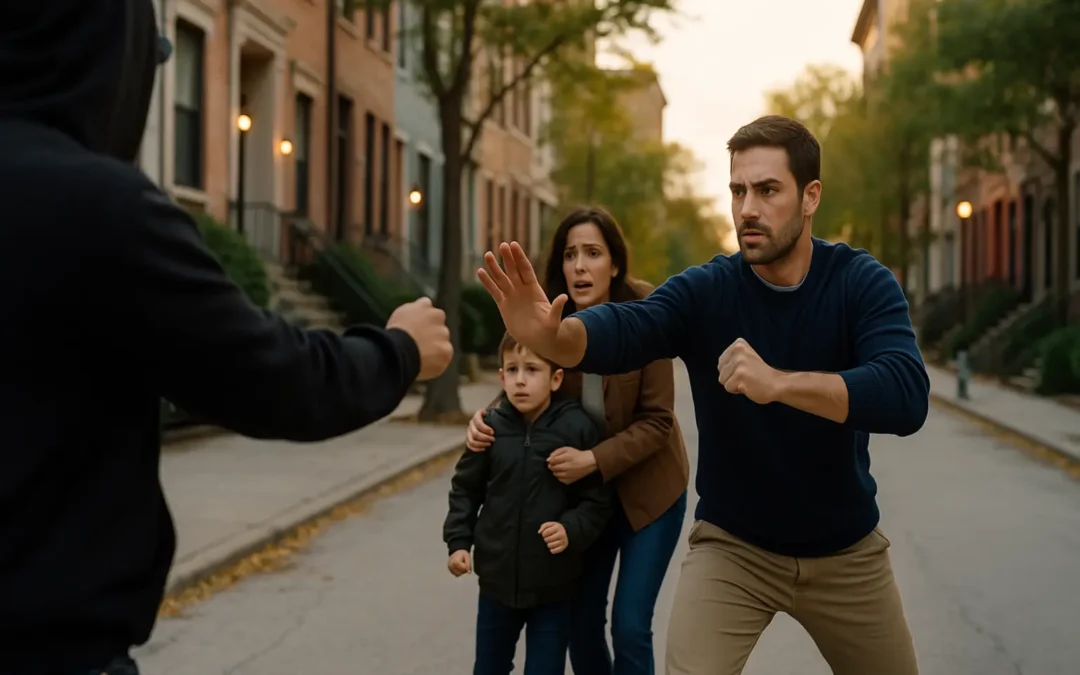
by Michael Glasser | Sep 6, 2025 | Criminal Defense Law
What Is Florida’s Stand Your Ground Law?
Florida’s Stand Your Ground law is a self-defense statute that allows individuals to use force—including deadly force—without a duty to retreat, if they reasonably believe it is necessary to prevent death, serious injury, or the commission of a forcible felony.
This law can have a major impact on criminal cases involving assault, battery, manslaughter, or homicide.
At The Law Office of Michael Glasser, P.A., we use every legal tool available to protect our clients’ rights—including Stand Your Ground immunity when appropriate.
Key Features of Stand Your Ground in Florida
Florida Statutes § 776.012 and § 776.032 lay out the specifics of the law:
-
You are not required to retreat before using force in self-defense.
-
You may use deadly force if you reasonably believe it is necessary to prevent imminent death, serious bodily harm, or a forcible felony.
-
The law applies in your home, vehicle, or any place you have a legal right to be.
-
If successful, a Stand Your Ground defense can lead to complete immunity from criminal prosecution and civil liability.
When Can You Use Stand Your Ground?
The law can apply in cases where:
-
You are attacked in a public place and respond with force
-
You use a firearm to defend yourself against an intruder
-
You are involved in a road rage incident that escalates
-
You defend someone else who is being attacked
However, the law does not protect you if:
-
You were committing a crime at the time
-
You provoked or escalated the conflict
-
The force you used was unreasonable under the circumstances
How Is Stand Your Ground Different From the Castle Doctrine?
Florida also follows the Castle Doctrine, which presumes you acted reasonably when using deadly force against an intruder in your home. Stand Your Ground expands that right beyond the home to any lawful location.
Using Stand Your Ground in Court: How It Works
-
Pretrial Immunity Hearing: If your attorney raises Stand Your Ground, you may be entitled to a pretrial hearing. At this stage, the judge—not a jury—determines whether you acted in lawful self-defense.
-
Burden of Proof: The defense must present evidence supporting your claim. If the judge finds your use of force was justified, the case may be dismissed before trial.
-
Trial Defense: If immunity is denied, you can still argue self-defense at trial. The jury will then evaluate whether your actions were reasonable under the law.
Our firm has experience filing and arguing Stand Your Ground motions. These are highly technical legal proceedings that require precise preparation and understanding of both facts and law.
Controversy and Public Misunderstanding
Florida’s Stand Your Ground law has received national attention in high-profile cases like those of Trayvon Martin and Markeis McGlockton. Critics argue it encourages vigilante justice, while supporters say it protects innocent people forced into dangerous situations.
Because of this, prosecutors may be reluctant to dismiss cases even when the law applies. That’s why having an aggressive, experienced criminal defense lawyer is crucial.
Examples of Cases Where It Might Apply
-
Bar Fight Turns Deadly: You’re confronted by a group and strike one individual with fatal results.
-
Parking Lot Dispute: Someone threatens you with a weapon, and you respond with gunfire.
-
Home Invasion Spillover: You chase a burglar outside and use force when they threaten you.
Each situation is fact-sensitive. Whether Stand Your Ground applies depends on your behavior, your perception of the threat, and the evidence.
How Michael Glasser Builds a Strong Stand Your Ground Defense
At The Law Office of Michael Glasser, P.A., we thoroughly analyze every aspect of your case:
-
Scene reconstruction and witness interviews
-
Surveillance footage and 911 calls
-
Use-of-force experts and self-defense testimony
-
Deep knowledge of Florida criminal statutes and case law
We will aggressively pursue Stand Your Ground immunity if it benefits your case—and we won’t hesitate to fight at trial if needed.
Arrested After Defending Yourself? Call Now
If you’ve been arrested after defending yourself or someone else, don’t assume the legal system will be fair without a fight. Prosecutors may push forward even when the facts favor you.
📞 Call (954) 242-1951 for a free consultation with a Fort Lauderdale criminal defense attorney who understands Florida’s Stand Your Ground law inside and out.
You have the right to defend yourself. Let us defend your future.
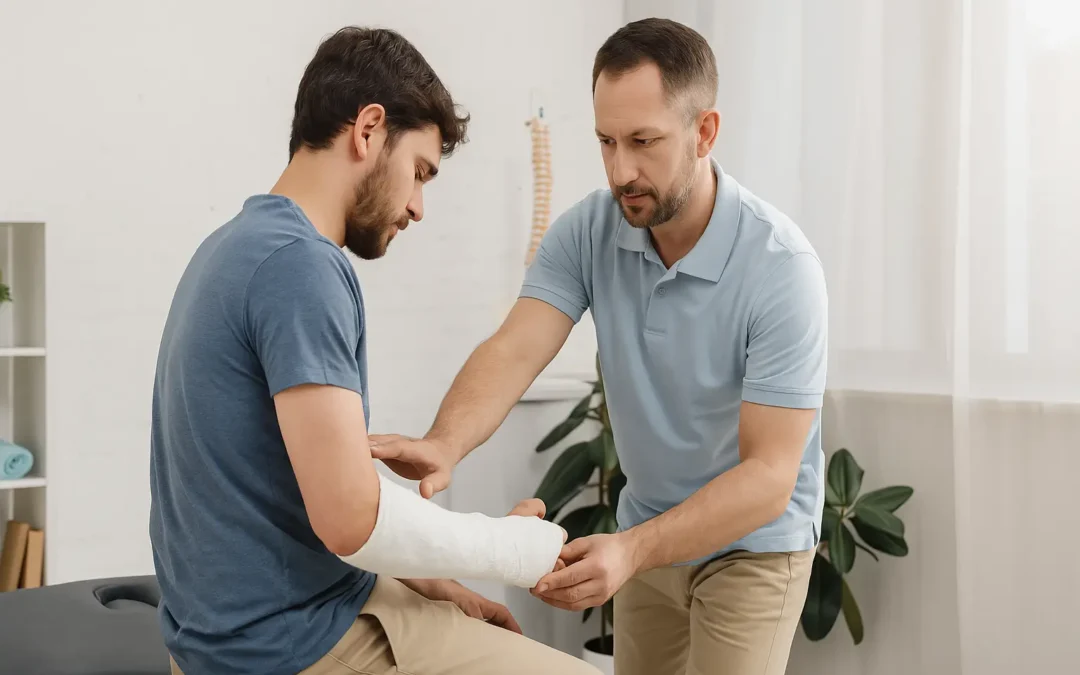
by Michael Glasser | Sep 6, 2025 | Criminal Defense Law
Injured in a Crash? Here’s What to Do Next
A car accident can be a shocking and chaotic experience—especially if you or someone else is hurt. What you do in the moments and days after a collision can significantly affect your health, your ability to file a claim, and your legal rights. At The Law Office of Michael Glasser, P.A., we help accident victims in Fort Lauderdale navigate the aftermath of serious crashes.
Here are the five most important steps to take immediately following a car accident in Florida.
1. Ensure Safety and Call 911
Your safety and the safety of others comes first. If you’re able to do so:
-
Move vehicles to a safe location if they’re blocking traffic
-
Check yourself and passengers for injuries
-
Call 911 to report the accident, even if it seems minor
The police will create an official accident report, which is often crucial for insurance and legal claims. Don’t leave the scene—doing so could lead to criminal charges.
2. Seek Medical Attention Right Away
Some injuries (like whiplash, concussions, or internal bleeding) don’t show symptoms immediately. Florida’s Personal Injury Protection (PIP) laws require you to seek medical care within 14 days to be eligible for insurance coverage.
Go to the ER, urgent care, or your doctor—even if you think you’re okay. Medical documentation is key to proving your injuries later.
3. Document the Scene and Exchange Information
If you’re physically able:
-
Take photos of vehicle damage, injuries, skid marks, street signs, and debris
-
Get contact and insurance info from all drivers involved
-
Collect witness names and numbers, if any
-
Record the police officer’s name and report number
This evidence may support your claim and protect you from being blamed for something you didn’t do.
4. Report the Accident to Your Insurance—But Be Cautious
You should notify your insurance company of the accident as soon as possible, but be careful with your words:
Avoid giving a recorded statement to the other driver’s insurance without speaking to a lawyer first. Their job is to protect their company, not you.
5. Contact a Fort Lauderdale Personal Injury Attorney
Before signing anything or accepting a settlement, speak to an experienced car accident lawyer. Insurance companies often offer lowball settlements that don’t cover your full medical expenses, lost wages, pain and suffering, or future care.
At The Law Office of Michael Glasser, P.A., we handle every step of your case so you can focus on recovery. We:
-
Investigate the accident and gather evidence
-
Handle all communication with insurance companies
-
Calculate the full value of your claim
-
Fight for the maximum compensation you deserve—at the negotiation table or in court
You pay nothing upfront, and we only get paid if we win your case.
Know Your Rights Under Florida Law
Florida is a no-fault insurance state, meaning your own PIP insurance pays for initial medical expenses regardless of who caused the accident. However, you may still sue the at-fault driver if:
-
You suffered serious or permanent injuries
-
Your expenses exceed PIP coverage
-
The at-fault party was grossly negligent (e.g., drunk driving)
That’s why speaking to a qualified personal injury lawyer is essential—even in a no-fault state.
Common Car Accident Injuries We Handle
Our firm represents clients suffering from a range of auto accident injuries, including:
-
Neck and back injuries (whiplash, herniated discs)
-
Concussions and traumatic brain injuries (TBI)
-
Broken bones and fractures
-
Spinal cord injuries and paralysis
-
Internal bleeding or organ damage
-
Psychological trauma like PTSD or anxiety
These injuries can disrupt your life, career, and family. We work with medical experts to document the full impact of your accident and seek the compensation you truly need.
Protect Yourself—Call Michael Glasser Today
Don’t let an insurance company undervalue your injuries or delay your claim. Whether your car accident happened on I-95, US-1, or anywhere in Broward County, we’re ready to help.
📞 Call (954) 242-1951 or contact us online for a free consultation.
We’ll explain your rights, evaluate your claim, and fight for the justice and compensation you deserve.
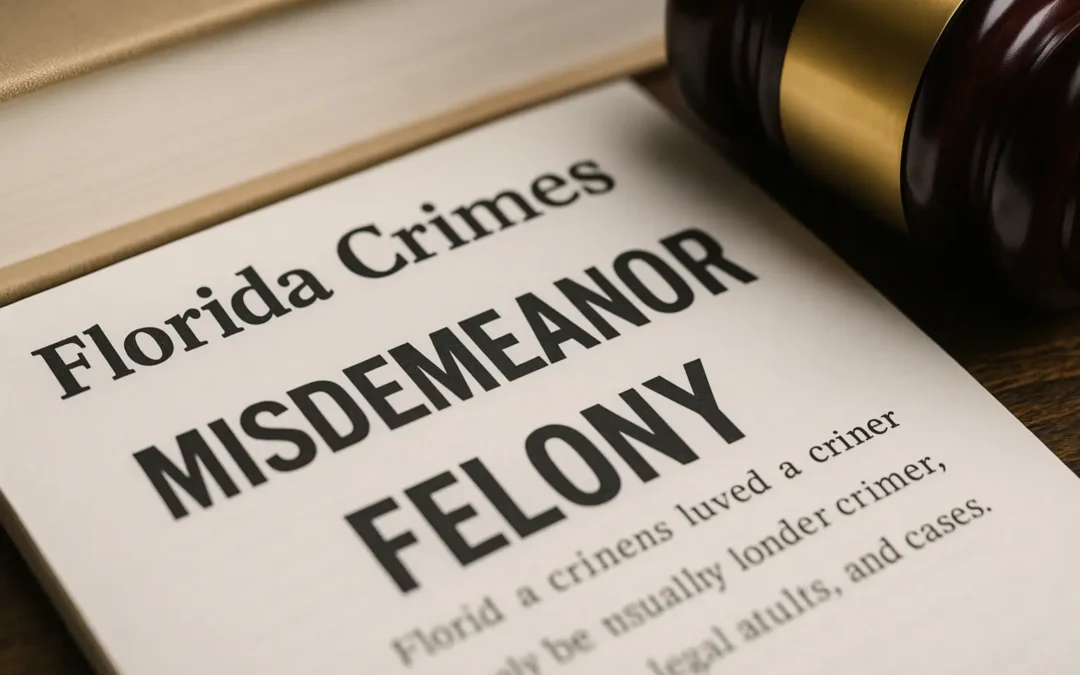
by Michael Glasser | Sep 6, 2025 | Criminal Defense Law
Understanding Misdemeanors vs. Felonies in Florida Criminal Law
If you’ve been charged with a crime in Florida, one of the first questions you’ll face is whether your offense is classified as a misdemeanor or a felony. This distinction affects everything from potential jail time to long-term consequences like your ability to vote, obtain a job, or carry a firearm.
In this article, we break down the major differences between misdemeanors and felonies under Florida law, what each entails, and why it’s essential to consult with a qualified defense attorney.
What Is a Misdemeanor?
Misdemeanors are considered less serious offenses under Florida law, but they still carry serious consequences. They are divided into two degrees:
Second-Degree Misdemeanor
First-Degree Misdemeanor
-
Maximum 1 year in jail
-
Up to 1 year probation
-
Up to $1,000 fine
-
Examples: DUI (first offense), domestic violence (simple battery), theft ($100–$750), possession of drug paraphernalia
Even a second-degree misdemeanor conviction goes on your criminal record, which can affect your employment and housing opportunities.
What Is a Felony?
Felonies are more serious crimes and carry longer prison sentences and heavier fines. They are categorized into several degrees based on the severity of the crime:
Third-Degree Felony
-
Up to 5 years in prison
-
Up to 5 years probation
-
Up to $5,000 fine
-
Examples: Grand theft, aggravated assault, possession of cocaine, burglary of an unoccupied structure
Second-Degree Felony
First-Degree Felony
-
Up to 30 years in prison (life in some cases)
-
Up to $10,000 fine
-
Examples: Armed robbery, sexual battery, trafficking in large amounts of drugs
Life Felony / Capital Felony
-
Life imprisonment or the death penalty
-
Reserved for the most severe crimes: first-degree murder, certain child sex crimes, etc.
A felony conviction can strip away many civil rights, including:
-
The right to vote or run for office
-
The right to own or carry a firearm
-
Professional licensing in certain industries
-
Federal aid or housing assistance
Other Key Differences
| Category |
Misdemeanor |
Felony |
| Jail Time |
Up to 1 year (county jail) |
Over 1 year (state prison) |
| Court Level |
County court |
Circuit court |
| Jury Size |
6 jurors |
6–12 jurors |
| Background Impact |
May be sealed or expunged |
Very limited expungement options |
| Civil Rights |
Retained |
May be lost (voting, firearms, etc.) |
Can a Misdemeanor Become a Felony?
Yes. Certain circumstances can elevate a misdemeanor to a felony, such as:
-
Repeat offenses (e.g., third DUI becomes a felony)
-
Use of a weapon
-
Injury to a victim
-
Crimes committed in a school zone, against a minor, or while on probation
Why Legal Representation Matters—Regardless of the Charge
Whether you’re charged with a misdemeanor or a felony in Florida, the consequences can be life-altering. Even a misdemeanor conviction can follow you for years, while a felony may change the course of your life permanently.
At The Law Office of Michael Glasser, P.A., we take every charge seriously and build strategic, aggressive defenses to protect your future. We examine the evidence, challenge police procedures, and negotiate or litigate for the best possible result.
Speak With a Fort Lauderdale Criminal Defense Attorney Today
If you’re facing criminal charges in Broward County—misdemeanor or felony—don’t wait to get legal help. Michael Glasser has over 15 years of experience defending clients in Fort Lauderdale and throughout South Florida.
📞 Call (954) 242-1951 or contact us online today to schedule a free, confidential consultation.
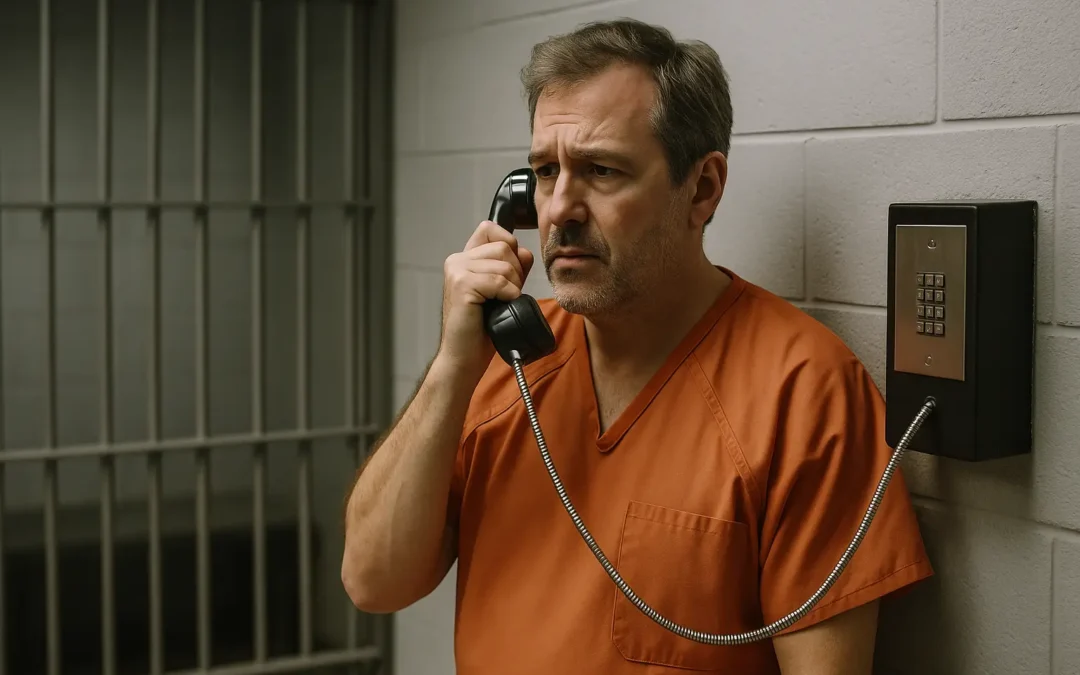
by Michael Glasser | Sep 6, 2025 | Criminal Defense Law
Arrested for DUI in Broward County? Here’s What Happens Next
If you’ve been arrested for driving under the influence (DUI) in Fort Lauderdale or anywhere in Broward County, you’re likely feeling overwhelmed and unsure of what comes next. Florida takes DUI offenses seriously, and the legal process can move quickly. Here’s a clear, step-by-step breakdown of what to expect after a DUI arrest and how a skilled defense attorney can help you navigate it.
Step 1: Immediate Driver’s License Suspension
Upon arrest for DUI, if you:
your driver’s license is automatically suspended by the Florida Department of Highway Safety and Motor Vehicles (DHSMV).
You’ll receive a temporary permit valid for 10 days. During this time, you must act fast to request a formal review hearing if you want to fight the administrative suspension.
Quick Tip: You have only 10 calendar days to request this hearing. If you miss the deadline, the suspension stands—even if you beat the criminal DUI case later.
Step 2: Booking and Bail
After arrest, you’ll be taken to jail for processing and booking. Most people charged with DUI are:
-
Held overnight
-
Released once their BAC drops below .05
-
Or allowed to post bail or bond (usually between $500–$1,000)
Once released, you’ll be given a court date—typically your arraignment.
Step 3: DUI Arraignment
Your first court appearance is called an arraignment. This is where you’ll be:
-
Informed of the formal charges
-
Asked to enter a plea (guilty, not guilty, or no contest)
If you hire an attorney before this date, they can appear on your behalf and enter a not guilty plea—often sparing you the stress of attending.
Step 4: Pre-Trial Hearings and Motions
This stage involves:
-
Discovery (review of police reports, videos, breath results)
-
Filing motions to suppress evidence (illegal stop, faulty breathalyzer, etc.)
-
Negotiations with the prosecution
Many DUI cases are resolved during this phase—either through dismissal or plea agreements. The strength of your defense will determine the direction.
Step 5: Trial (If Needed)
If no agreement is reached and you maintain a plea of not guilty, your case may proceed to trial.
DUI trials in Florida are usually heard by a six-person jury. The prosecution must prove, beyond a reasonable doubt, that you were impaired or had an unlawful BAC while driving.
Your defense may include:
-
Challenging the accuracy of the breath test
-
Questioning the legality of the stop or arrest
-
Arguing lack of impairment or alternate causes for behavior
An experienced DUI attorney will present evidence, cross-examine officers, and fight for acquittal.
Step 6: Sentencing and Penalties
If convicted, sentencing depends on:
-
Whether it’s a first-time DUI or repeat offense
-
Your BAC level
-
Whether there was an accident, injury, or minor in the car
First Offense DUI Penalties in Florida May Include:
-
Up to 6 months in jail
-
Fines between $500 and $1,000
-
License suspension (6 months to 1 year)
-
DUI School (12+ hours)
-
Community service
-
Vehicle impoundment
-
Ignition interlock device (in some cases)
How a DUI Lawyer Can Help
Hiring a Fort Lauderdale DUI lawyer early gives you the best chance of minimizing—or even avoiding—these penalties. At The Law Office of Michael Glasser, P.A., we:
-
Fight to prevent license suspension
-
Challenge the legality of the arrest and test procedures
-
Pursue dismissal or reduction of charges
-
Represent you in DMV hearings and court
-
Help you apply for hardship licenses
With over 15 years of DUI defense experience in Broward County, Michael Glasser knows how to strategically challenge the prosecution’s case and protect your record.
Don’t Wait – Your Future Is On the Line
A DUI charge isn’t just a traffic ticket—it’s a criminal offense with long-term consequences. Whether this is your first DUI or you’ve been through this before, the right legal representation can make a significant difference.
Contact The Law Office of Michael Glasser, P.A. Today
📞 Call (954) 242-1951 or contact us online for a free, confidential DUI case review.
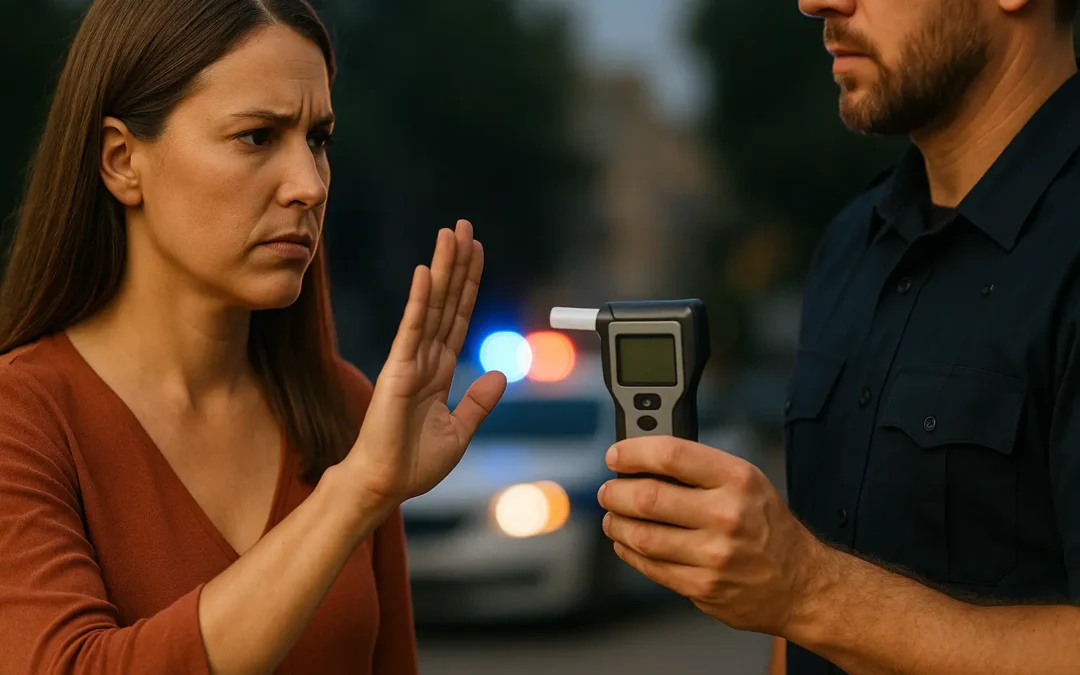
by Michael Glasser | Sep 6, 2025 | Criminal Defense Law
Understanding Florida’s Implied Consent Law
Florida’s Implied Consent Law requires drivers lawfully arrested for DUI to submit to a breath, blood, or urine test. Refusing a breathalyzer may seem like a good idea in the moment—but it can lead to immediate consequences and complicate your case later.
Here’s what you need to know if you’re pulled over or arrested for driving under the influence in Florida.
Can I Legally Refuse a Breath Test?
Technically, yes—you can refuse. However, refusal comes with automatic penalties under Florida law.
When you get a driver’s license in Florida, you agree in advance to submit to chemical testing if lawfully arrested for DUI. This is called implied consent.
So while you have the right to refuse, the state can punish you for doing so, even if you’re never convicted of DUI.
First-Time Refusal Penalties
If it’s your first refusal, you face:
-
A 1-year driver’s license suspension
-
Use of your refusal as evidence against you in court
-
A potential fine and points on your driving record
You are not automatically guilty of DUI for refusing, but prosecutors often argue that refusal implies consciousness of guilt.
Second or Subsequent Refusals
If you’ve previously refused a breath, blood, or urine test, a second refusal is a criminal offense under Florida Statute §316.1939.
Penalties may include:
Even if your DUI charge is dropped or dismissed, you can still be prosecuted for refusal alone.
Roadside Breath Test vs. Official Test
Florida law distinguishes between:
-
Preliminary (roadside) breath tests – Typically done before arrest. These are voluntary for adults over 21.
-
Evidentiary breath tests – Administered at the police station after arrest. Refusal here triggers Implied Consent penalties.
You can usually decline the roadside test without consequences. But once you’re arrested, refusing the official breathalyzer has legal consequences.
Should You Refuse the Test?
There’s no one-size-fits-all answer. Some drivers choose to refuse because:
-
They’ve had multiple drinks and fear a high BAC.
-
They’re worried about additional DUI penalties if over 0.15%.
-
They don’t trust the accuracy of the machine.
However, refusal makes it easier for the state to suspend your license and may hurt your chances in court.
In some cases, especially if you haven’t had much to drink, taking the test may be the better choice.
How Can a DUI Attorney Help After Refusal?
At The Law Office of Michael Glasser, P.A., we fight to:
-
Challenge the legality of the stop or arrest (no probable cause = no valid test requirement)
-
Suppress the refusal if police didn’t inform you of the consequences
-
Request a hardship license so you can continue driving to work or school
-
Build a strong DUI defense, even without a BAC result
We examine every angle—from dashcam footage to officer reports—to challenge the case against you.
Hardship License After Refusal
If it’s your first refusal and you act quickly, you may qualify for a hardship license to drive for work, school, or essential purposes.
You must:
-
Enroll in DUI School
-
Apply for a formal review hearing within 10 days of arrest
-
Meet eligibility criteria for restricted driving privileges
We guide clients through the entire DMV process to minimize disruption to their lives.
Get a Fort Lauderdale DUI Lawyer on Your Side
DUI charges—and breath test refusals—can spiral into serious legal problems if not handled correctly. Don’t go it alone.
Michael Glasser is a seasoned Fort Lauderdale DUI defense attorney with over 15 years of experience defending drivers in Broward County. Whether you took the test or refused it, we fight to protect your license, your record, and your freedom.
Arrested for DUI or Refused a Breathalyzer?
📞 Call (954) 242-1951 or contact us online for a free, confidential case review.
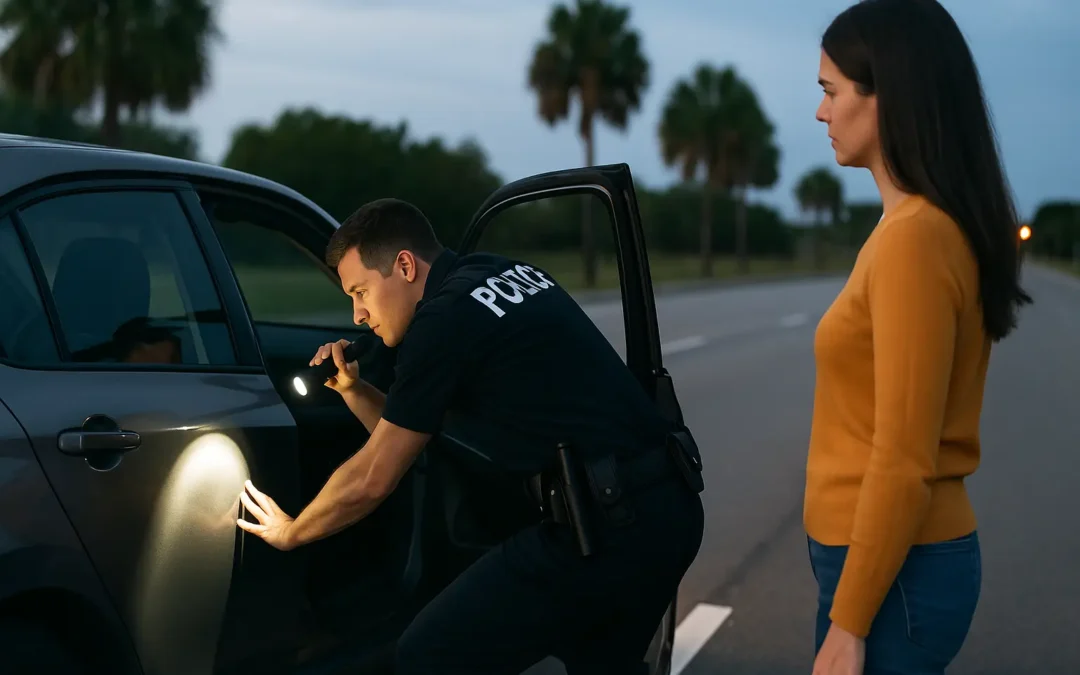
by Michael Glasser | Sep 6, 2025 | Criminal Defense Law
Your Rights During a Vehicle Search in Florida
If you’ve ever been pulled over in Florida, you may wonder:
“Can the police search my car without a warrant?”
The short answer is: yes, under certain circumstances. But that doesn’t mean every search is legal—or that you’re powerless. Understanding your rights is critical to protecting yourself during a traffic stop or criminal investigation.
The Fourth Amendment and Vehicle Searches
The Fourth Amendment to the U.S. Constitution protects you from unreasonable searches and seizures. In general, police need a warrant to search your property—but vehicles are an exception.
Courts have carved out multiple exceptions that allow police to search a vehicle without a warrant, especially if they believe there’s probable cause to suspect a crime is being committed.
When Police Can Search Your Car Without a Warrant
-
Consent
-
If you agree to a search, the officer does not need a warrant or probable cause.
-
You have the right to say “No, I do not consent to a search.” Politely asserting your rights is not a crime.
-
Probable Cause
-
If the officer smells marijuana, sees drugs or weapons in plain view, or has other strong evidence of a crime, they can search your vehicle without your permission.
-
Probable cause must be based on objective facts—not a hunch.
-
Search Incident to Arrest
-
If you are arrested (even for a minor traffic violation), police may be allowed to search your car, especially the areas within your reach.
-
This does not automatically give them the right to search the trunk or locked compartments unless there’s probable cause.
-
Inventory Search
-
Plain View Doctrine
-
Exigent Circumstances
When Police Cannot Search Your Car
-
No consent, no probable cause: If the officer lacks both, they generally cannot search your vehicle.
-
Traffic stop only: Being pulled over for a broken taillight or speeding does not give police automatic authority to search your car.
-
Questionable smell alone: While odor of marijuana used to provide probable cause, evolving laws around hemp and medical cannabis have complicated this justification.
What Should You Do During a Traffic Stop?
✅ Stay Calm and Respectful
Arguing or becoming aggressive increases your risk and won’t help legally.
✅ Don’t Consent to a Search
If asked, say: “I do not consent to a search.” This protects your rights even if the search proceeds.
✅ Do Not Lie or Interfere
Lying to police or obstructing their investigation can lead to separate charges.
✅ Ask If You Are Free to Leave
If you’re not being detained or arrested, you may ask: “Am I free to go?”
✅ Record the Encounter (if safe)
If legal in your area, recording the stop on your phone can preserve valuable evidence for later.
What Happens If the Police Violate Your Rights?
If the police conduct an illegal search, your attorney may be able to file a motion to suppress any evidence found. If the judge grants it, that evidence can’t be used against you—and in many cases, the charges may be dismissed entirely.
Michael Glasser, an experienced Fort Lauderdale criminal defense attorney, has successfully challenged unlawful searches throughout Broward County and beyond.
Defending Against Unlawful Vehicle Searches
At The Law Office of Michael Glasser, P.A., we thoroughly review the legality of every traffic stop and vehicle search. We investigate:
-
Whether there was valid probable cause
-
The scope and method of the search
-
Whether your rights were properly explained (Miranda)
-
Any body cam or dash cam evidence
-
The chain of custody for any seized items
Know Your Rights—Protect Your Future
Don’t let a questionable search turn into a criminal conviction. If you’ve been arrested following a vehicle search in Fort Lauderdale or surrounding areas, we are ready to challenge the evidence and fight for your rights.
📞 Call (954) 242-1951 or contact us for a free, confidential consultation.
Available 24/7. Proven experience. Aggressive defense.
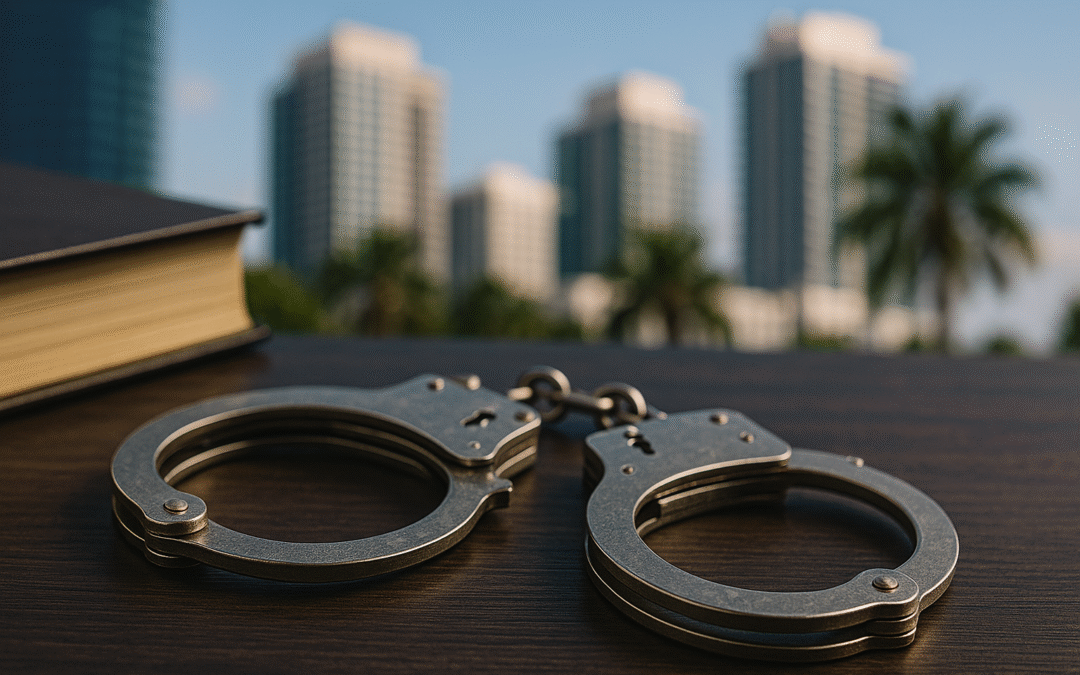
by Michael Glasser | Sep 6, 2025 | Criminal Defense Law
Getting Arrested Is Overwhelming. Here’s How to Protect Yourself Right Away.
Whether it’s your first arrest or not, getting handcuffed, booked, and thrown into the criminal justice system can be terrifying. You may be unsure what to say, who to trust, or what’s going to happen next. One wrong move could seriously hurt your case.
At The Law Office of Michael Glasser, P.A., we’ve helped hundreds of clients through this moment. Here’s what you need to do—immediately—after being arrested in Fort Lauderdale or anywhere in Broward County.
1. Stay Silent. Invoke Your Rights.
The single most important thing you can do is stay quiet. You have the right to remain silent, and you should use it. Do not:
You must clearly say:
“I want to remain silent. I want a lawyer.”
This stops the interrogation and protects you from accidentally incriminating yourself. Even seemingly innocent statements can be twisted against you.
2. Do Not Consent to Searches
Police may try to search your car, home, or belongings. Unless they have a valid search warrant or legal justification, you are not required to consent.
Calmly say:
“I do not consent to a search.”
If they search anyway, your attorney can challenge it later. But giving permission waives your rights.
3. Call a Criminal Defense Attorney ASAP
Time is critical. The sooner you contact a lawyer, the better your chances of getting charges reduced or dismissed.
At our firm, you can reach Attorney Michael Glasser 24/7. We immediately start protecting your rights, gathering evidence, and advising you on what to say or do. We also work quickly to secure bail or argue for release at a first appearance hearing.
4. Avoid Talking About Your Case — Especially Online
Don’t talk to friends or family about the case in detail. And never post anything about your arrest on social media. Prosecutors monitor platforms like Facebook, Instagram, and X (formerly Twitter) for incriminating posts.
Even text messages and private DMs can be subpoenaed and used against you.
5. Document Everything You Remember
While it’s fresh in your mind, write down:
-
What happened before, during, and after your arrest
-
Names or badge numbers of officers involved
-
Any witnesses who were present
-
What was said to you and what you said
This info can be vital to building your defense.
6. Understand the Charges Against You
In Florida, you may be charged with a misdemeanor or a felony depending on the severity of the alleged offense. You’ll be told your charges during booking or your first appearance (within 24 hours of arrest).
Examples of common charges in Fort Lauderdale include:
Knowing the exact charges is key to planning your defense. Your attorney will review the case, explain the law, and advise you on how to proceed.
7. Show Up to Court—Prepared
Missing court is a serious mistake. It can result in a warrant for your arrest, higher bail, or even new charges. Work with your lawyer to prepare for your first appearance, arraignment, and any hearings that follow.
If you’re released on bond, stay out of trouble and follow all court-ordered conditions.
Final Thoughts: Early Legal Help Makes All the Difference
The hours and days following your arrest are critical. What you say and do can either strengthen your case—or make it worse. At The Law Office of Michael Glasser, P.A., we step in immediately to protect your rights, explain your options, and start building your defense.
Whether you’re charged with a misdemeanor, felony, or federal crime, you deserve aggressive, experienced representation.
Have You or a Loved One Been Arrested in Fort Lauderdale?
📞 Call (954) 242-1951 now for a free and confidential consultation.
Or contact us online. We’re available 24/7.








